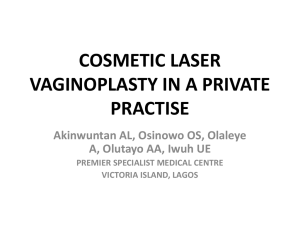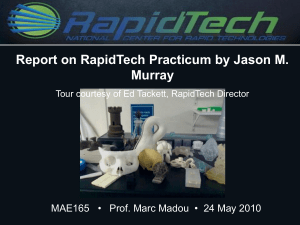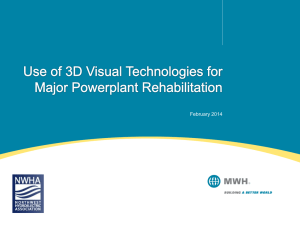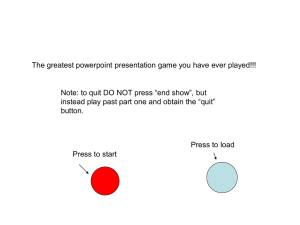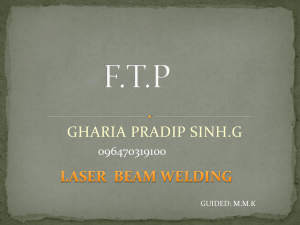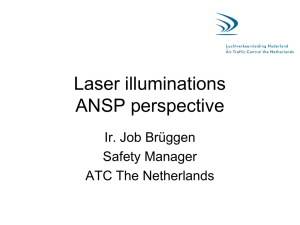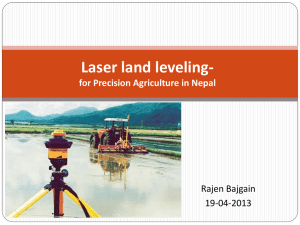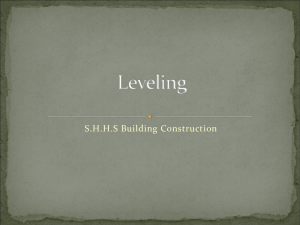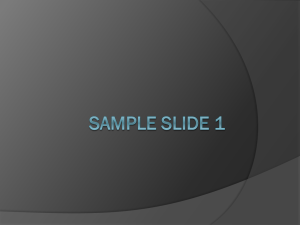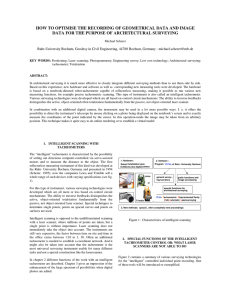Document
advertisement
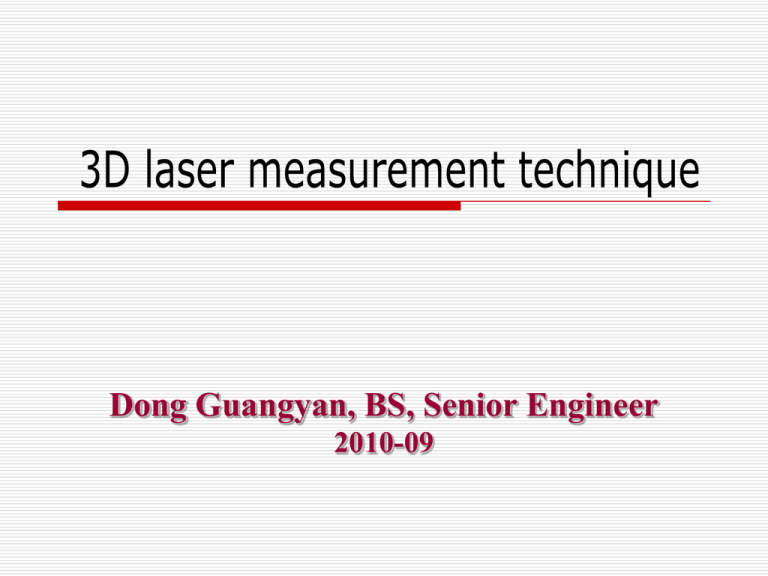
Dong Guangyan, BS, Senior Engineer 2010-09 Outline 1. Summary 2. Basic principle & typical specifications 3. Comparison with traditional surveying technologies 4. Application status 5. Advantages & disadvantages 6. Expectations 1. Summary A fire-new technical approach Single point manually collecting data continuously & automatically acquire batch data Two types---airborne and ground (according to difference of platforms) satellite borne 2. Basic principle and specifications of typical instrument Transmitter Interface Postprocessing Signal processing Target Receiver Figure 1 Principle sketch map of 3D laser surveying system The hardcore is a 3D laser scanner ,which mainly consists of the laser transmitter, receiver, scanning system and bracket system,meanwhile, it integrates with CCD digital camera and internal calibration systems as well. Basic principle Non-contact, high speed laser measurement mode Acquiring 3D data of terrain and array geometry of surface of complicated object with point cloud. TOF (Time of Flight) pulse ranging method Approach to calculation of 3D laser spot coordinate for pulse ranging method Basic principle Calculation expressions: X s S cos cos Ys S cos sin Z s S sin Z P(Xs,Ys,Zs) S θ X α Y Figure 2 Spatial coordinate system of 3D laser surveying system Typical instrument Optech ILRIS-36D Capture Every Dimension Typical instrument Leica HDS3000 Typical instrument Mensi GX RD 200+ Main specifications of typical instrument Manufacturer Optech Leica Mensi Products ILRIS-36D HDS3000 GX RD200+ Laser Security Class 1 1500nm Class 3 Class 3 532nm Ranging accuracy 7mm@100m Single point 4mm@50m Single point 7mm@100m Positioning accuracy 8mm@100m 6mm@50m Single point 12mm@100m Range (min.) 1.5m 1m 1m Range( max.) 1500,1000,800 80% 40% 20% 2600m for DR 110°V×360°H 300m@90% 134m@18% 200m-90% 350m 270°V×360°H 60°V×360°H Scan angle of view Built-in 6 million pixels 1 million pixels Integrative color camera digital camera 24°×24° 111 pictures 5.5 × optical zooming Postprocessing software Polyworks/Inspector Cyclone Realworks Modeling precision 3mm 2mm 2mm 3. Comparison with traditional surveying technologies Different requirements for measurement accuracy and ambients Different raw data patching format Different data combined modes among the sites Different build modes for TIN models Different extract modes for grains 4. Application status 3D laser scanning system can rapidly rebuild a 3D solid model of an object. 3D laser point cloud data can also use the complete target data for post processing(such as:mapping, computation, stress analysis, finite element analysis, simulation analysis, mission analysis, ⋯etc.) It is a symmetric application of all kinds of forward engineering tools (e.g.:CATIA, UG, CAD, PDMS, PDS, GIS, VR, 3DSMAX, MAYA, ERP, etc.) 4. Application status Generate data image by surveying a target’s 3D coordinate,then process the data to extract 3D information and generate: a)Digital elevation model DEM with high accuracy, contour map and orthograph; b)3D solid image of buildings; c)Urban 3D diorama; d)Height of trees, vegetation 4. Application status Figure 3 Image of 3D laser surveying system 4. Application status Figure 4 Buildings extracted from Figure 3 4. Application status Fields covered:cultural relic, archaeology, architectonics, spaceflight, aviation, shipping, manufacture, military industries, military, petrifaction, medicine, water conservancy, energy sources, electric power, traffic, machinery, movies & TV, education, scientific research, automobile, public security, city construction⋯⋯ Application Historical Preservation Application Historical Preservation Application Urban Planning Application Urban Planning Application Industrial Survey 5. Advantages & disadvantages Advantages: High speed,complete measurement, accurate,multiangle-of-view observation; Non-contact measurement,all-weather; Shape measurement for completed surfaced object,color revivification; Mark and measure relative model data, such as range, altitude difference, volume, surface area, section, 2D picture etc. Build all kinds of geometry shape,such as elbow, taper tube etc. Convert 3D model into data format of CAD system or different software operating platforms for 3D modeling. Advantages example With point cloud of intensity information, it will support output to CAD environment for editing and analysis. Advantages example The point cloud figure with RGB information can revert the environmental information.• 5. Advantages & disadvantages Disadvantages and challenges: 3D laser scanner is a black box system,it is hard to calibrate; Current instrument are still not perfect in miniaturization and price,and they are top grade equipment in market; Longer processing time after data scan; The scan data patch soft wares are not perfect (lack of compatibility)。 5. Advantages & disadvantages Disadvantages and challenges Lack of consideration of standardization, Lack of soft wares both practical and lower price; It is hard to use the fruits of 3D modeling for further speciality research; 3D modeling has certain subjectivity,and the laypeople usually visually are puzzled by virtual cartoon,surveyablity and science of 3D model is ignored. 6. Expectations Future works: ● Unification of term ● Establish data standard for accuracy requirement ● Data collection and post-processing requirements ● Approach to fruit accuracy assessment 3D laser scanning technique has unexampled advantages in 3D data rapid acquirement and build 3D model. It is prospective with further effort. Thanks!

